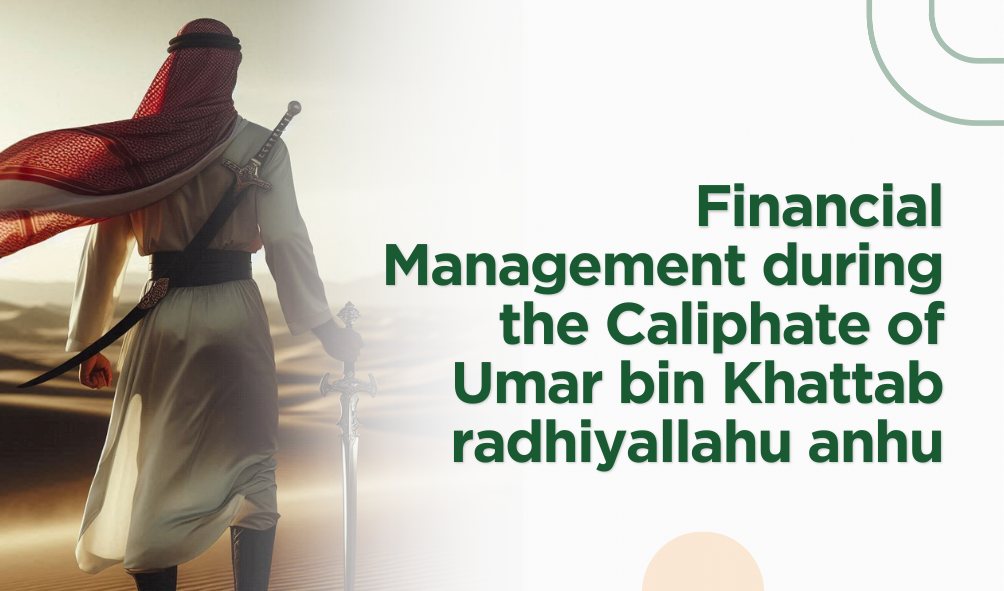Financial Management during the Caliphate of Umar bin Khattab radhiyallahu anhu
Financial management under the rule of Umar bin Khattab radhiyallahu anhu stands as a significant example of public finance administration focused on justice and social welfare. The policies he implemented not only reflect his economic acumen but also his commitment to Islamic principles of fairness and equitable distribution.
Establishment of Baitul Mal: The Financial Foundation
One of Umar’s key contributions was the establishment of Baitul Mal, the state treasury responsible for the collection and distribution of funds from various sources, including zakat, jizyah (tax on non-Muslims), kharaj (land tax), and war spoils. Under Umar’s leadership, Baitul Mal was not merely a financial manager but an instrument for achieving social justice. The funds collected were utilized for public projects such as building roads, bridges, and providing basic needs to the impoverished.
Diwan System: Innovation in Wealth Distribution
Umar also introduced the Diwan system, an administrative body responsible for the distribution of state wealth to individuals based on their contributions to the state and religion. This system highlights Umar’s strategic thinking in ensuring that every individual received their due share according to their role and contributions. The Diwan also recorded the stipends provided to soldiers and their families, as well as the companions of the Prophet who participated in the expansion of Islam. This policy not only strengthened social stability but also created incentives for active participation in state efforts.
Fiscal Policy: Ensuring Economic Stability
One of Umar’s most renowned fiscal policies was his refusal to distribute conquered lands in Iraq and Persia to individuals. Instead of dividing these lands among the soldiers, Umar maintained them as state property, and the revenue generated from these lands was used for the public good through land taxes (kharaj). This policy reflects Umar’s long-term vision in managing the state’s resources, ensuring that the revenue generated was used sustainably to support the state’s finances and prevent wealth concentration among a few individuals.
Transparency and Accountability: Pillars of Financial Management
Transparency and accountability were two core principles Umar applied in managing the state’s finances. All state revenues and expenditures were meticulously recorded and strictly monitored. Umar enforced high standards of integrity and responsibility in managing public funds. For instance, he rejected personal gifts from his governors, considering them potential influences on his decisions as the Caliph. These principles fostered public trust in the government and ensured that the state’s wealth was used for the common good.
Social Justice: Equitable Wealth Distribution
Umar’s financial policies were deeply rooted in social justice. He ensured that state wealth was not concentrated in the hands of a few but was equitably distributed among those in need. One example was the provision of stipends to widows, orphans, and the poor from the Baitul Mal funds. Additionally, Umar introduced policies to alleviate poverty by providing interest-free loans to those needing capital to start businesses. This policy reflects Umar’s understanding that a healthy economy must be based on fairness and social justice.
Conclusion
The financial management practices during the time of Umar bin Khattab radhiyallahu anhu highlight the importance of policies centered on justice, transparency, and social welfare in managing public finances. The policies implemented by Umar not only strengthened the economic stability of the Islamic state during his era but also served as a model for public financial management in subsequent generations.
Also Read:The Story of Abu Bakr Radhiyallahu Anhu’s Generosity in Giving Away All His Possessions

References:
- Shaer, S. (n.d.). Fikih Keuangan di Masa Umar bin Khattab. Retrieved from samirshaer.com
- Islamweb. (n.d.). Kebijakan Keuangan Umar bin Khattab radhiyallahu anhu. Retrieved from islamweb.net
- Almaqased. (n.d.). Sistem Keuangan di Masa Umar bin Khattab. Retrieved from almaqased.net
- Alukah. (n.d.). Manajemen Keuangan di Masa Umar bin Khattab. Retrieved from alukah.net







